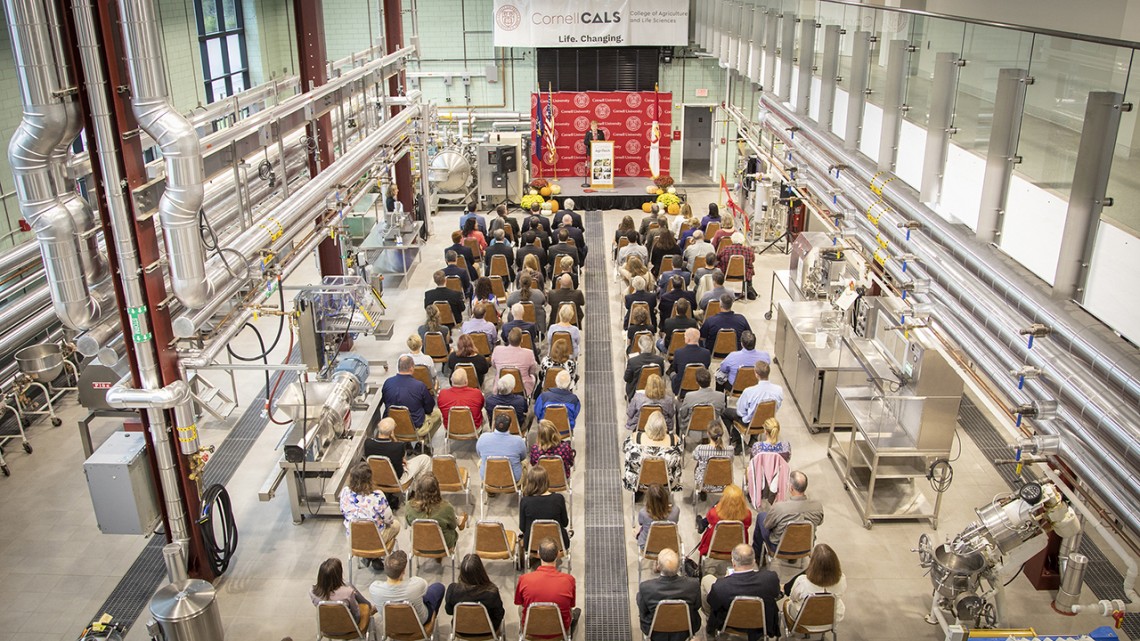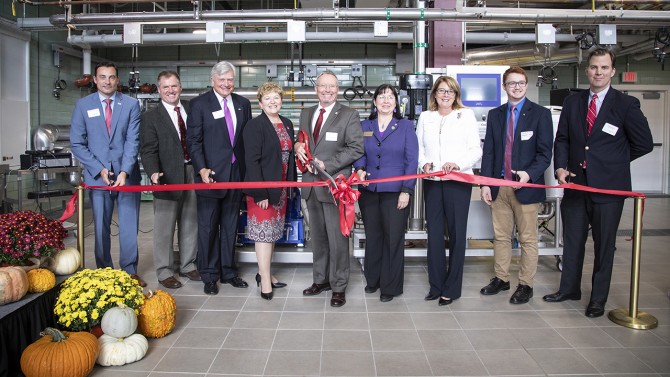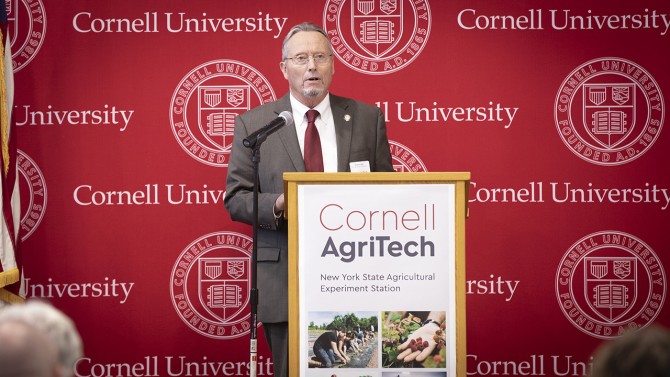
A packed crowd listens to Kathryn J. Boor ‘80, the Ronald P. Lynch Dean of CALS, at the ribbon-cutting opening the new pilot plant at the Cornell Food Venture Center.
$13M state investment revitalizes Cornell Food Venture Center
By Erin Flynn
Food entrepreneurs in New York are getting a big boost from advanced technologies and facilities now available at the Cornell Food Venture Center (CFVC).
The renovated CFVC pilot plant reopened Oct. 4 at a ribbon-cutting ceremony celebrating the enhanced capabilities of the state-of-the-art facility. The renovations were made possible through more than $13 million in funding from the state to grow food and beverage businesses in New York.
The Cornell Food Venture Center – part of the College of Agriculture and Life Sciences and located at Cornell AgriTech in Geneva, New York – supports more than 500 companies and brings approximately 2,000 products to market each year.
“Farms and local food are critical components of our Upstate economy and these improvements to Cornell’s hub for advanced food technology will help support farmers and food entrepreneurs across the region,” said Gov. Andrew Cuomo. “When we invest in how our food is grown, processed and packaged, we are investing in a stronger, healthier New York for all.”
Kathryn J. Boor ’80, the Ronald P. Lynch Dean of CALS, thanked New York state for its investment in food processing and innovation. “The newly revitalized facilities will give Cornell an even greater edge in supporting the farm and food community across New York state, which is central to our mission,” she said.
The event marked the 30-year anniversary of CFVC, a hub for food businesses that provides comprehensive assistance to beginning and established entrepreneurs. Cornell food science experts have helped thousands of entrepreneurs across the state launch products – from companies making sauces in Buffalo and New York City to a pickle maker in Syracuse and a maker of specialty culinary oils in the Finger Lakes.
The refurbished facility will help entrepreneurs introduce more natural ingredients, design smart packaging materials and incorporate other innovations in their products. Advanced engineering at the pilot plant allows manufacture of the same final food product using an assortment of processing technology options, bringing added flexibility to the facilities.
Olga Padilla-Zakour, Ph.D. ’91, director of the CFVC and professor and chair of the Department of Food Science, emphasized that technology-driven solutions are key to advancing today’s food industry.
“Upgrades at the plant will help meet increased demand for small- and large-scale batch production and modernized structures,” said Padilla-Zakour. “The additional equipment will allow our food entrepreneurs across New York to use our facility to develop new products without impeding their existing production schedules, and will allow entrepreneurs to make small batches for market-testing purposes.”
New technologies include continuous pasteurizers to produce safe beverages for refrigerated or shelf-stable products, batch pasteurizers for bottled products, and commercial pressure cookers to produce shelf-stable foods packaged in cans, glass or pouches.
New concentration and dehydration equipment will maximize the quality and longevity of liquids, sauces, jams, jellies and pastes. A modern homogenizer will increase the safety of products and allow for highly stable emulsions. Food products produced at the facility will also get a healthy boost through electric field units that allow for better extraction of nutrients.
Said David Monahan, CEO of Giovanni Foods of Baldwinsville, New York: “Without the help of the Cornell Food Venture Center, our products never would have made their way to grocery store chains such as Trader Joe’s, Wegmans and Aldi.”
Erin Flynn is senior manager at Cornell AgriTech.
Media Contact
Get Cornell news delivered right to your inbox.
Subscribe








